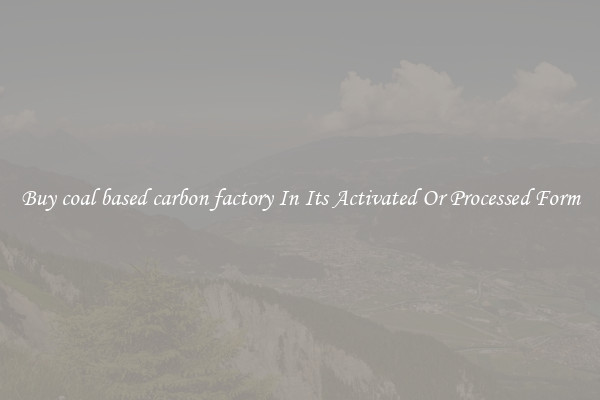Buy coal based carbon factory In Its Activated Or Processed Form
Coal has long been recognized as one of the most abundant and cost-effective sources of energy. However, in recent years, the utilization of coal has expanded beyond just power generation. One of the most valuable forms of coal, known as activated or processed carbon, has gained popularity due to its numerous applications in various industries.

Activated carbon, also referred to as activated charcoal, is a highly porous material that is created by heating coal or other carbonaceous materials to high temperatures, followed by an activation process that exposes it to gases like steam or carbon dioxide. This treatment results in a material with an expanded internal surface area, allowing it to absorb a wide range of contaminants and impurities.
The applications of activated carbon are diverse and widely utilized. In the environmental sector, it is extensively used for water and air purification. Activated carbon filters are capable of capturing organic compounds, chlorine, and volatile organic compounds (VOCs) from water, making it safe for consumption. Similarly, in air purification systems, activated carbon adsorbs harmful gases, particulate matter, and odors, resulting in cleaner and healthier air.
Furthermore, the pharmaceutical and healthcare industries greatly benefit from the properties of activated carbon. It is commonly used in the production of medicinal drugs, as it helps to remove impurities and toxins during the manufacturing process. Activated carbon is also used as an antidote for poisoning, as it can quickly absorb and neutralize toxins in the body, preventing further harm.
In addition to these applications, processed carbon is used in various sectors such as food and beverage, cosmetics, and metallurgy. It is an essential component in water and wastewater treatment plants, where it removes contaminants like heavy metals and industrial chemicals. In the food and beverage industry, activated carbon is used for decolorization and deodorization processes, ensuring high-quality end products. Moreover, cosmetics companies utilize activated carbon in face masks and skincare products due to its ability to draw out impurities from the skin.
Considering the plethora of applications and the growing demand for activated carbon, investing in a coal-based carbon factory seems like a lucrative opportunity. With a reliable source of high-quality coal, companies can establish an efficient production process to manufacture activated carbon and cater to the diverse needs of industries worldwide. Furthermore, the utilization of such a factory would efficiently utilize coal resources, maximizing their potential and reducing waste.
To conclude, the demand for activated carbon is steadily increasing due to its versatile applications in various industries. Establishing a coal-based carbon factory to produce activated or processed carbon could prove to be a profitable venture. Such a factory would not only contribute to meeting the growing demand for activated carbon but also make effective use of abundant coal reserves.

View details

View details

View details

View details








